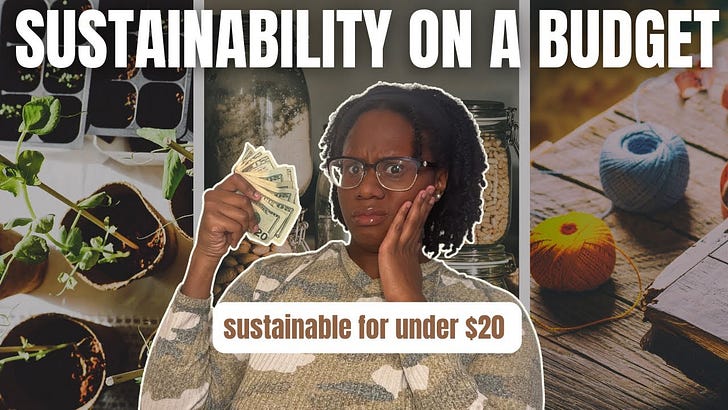How To Be Sustainable In This Economy
Hi everyone,
I know that everything is so expensive nowadays, and it may feel like there’s no way you could possibly live sustainably in this economy. However, even though you might struggle financially in this economy, that doesn’t mean you can’t live a sustainable life.
In this newsletter, I’ll explain how to be sustainable in this economy regardless of your financial situation.
Advice #1
The first advice is to use what you have. When some of us decide to start living sustainably, we might feel like we need to immediately buy clothing from sustainable brands, glass containers, and eco-friendly versions of items we already have.
If you want to be sustainable, the most sustainable thing is to use what you already have. There is no need to go out and buy eco-friendly versions if you have the item at home and it’s in good working condition.
If the item breaks or you can’t use it anymore, you can buy the eco-friendly version, but for now*, “if it ain’t broke, don’t fix it.”
Advice #2:
I gave this advice in the first video of this series: Learn handy skills, such as sewing, knitting, and gardening.
Let’s say your pants tear. Instead of throwing them away and buying a new pair, if you learn how to sew, you can sew the pants and continue to wear them. This helps you save money because you don’t have to spend money on pants, and it protects the environment because you keep those pair of pants out of the landfill.
Another example is that if you learned gardening, you could grow your own fruits and vegetables, which would eliminate the need to go to the grocery store often to get them.
YouTube is a great resource for learning these handy skills.
Advice #3:
The next piece of advice is to be mindful of the resources you use at work or home, such as water and energy.
I'm sure you've heard this plenty of times, but don't leave the water on when brushing your teeth, and turn off lights when leaving the room. Many people don't know these small changes can lower their energy and water bills and help the environment.
If you pay your energy and/or water bills, try this experiment: After you receive your bill, start conserving water and energy, and when you get your next bill, compare the total balances.
Advice #4:
The next piece of advice is to limit food waste. Only buy and make what you can realistically eat. We tend to overbuy food, and sometimes, we have to throw some of it away for various reasons.
In my opinion, throwing away food is like throwing away money because you spent your money on it, and now you’re throwing it away.
Food waste is a massive problem in the US. If you want me to discuss it in detail, let me know, but all I can say is that it is terrible.
Advice #5:
The next advice is to buy items secondhand. Everything is getting more expensive these days, so many of us can't afford the newer versions of items. But that doesn't mean we can't get it secondhand.
I want to debunk a misconception about secondhand products. Just because something is secondhand doesn't mean something is wrong with it.
People resell or donate items for various reasons. For example, the item might be too big or too small, not the right color, or not of the right quality.
Secondhand items are often cheaper, and help keep the item out of the landfill.
It is possible to be sustainable in this economy. The advice I gave might seem small or not impactful, but trust me, it’s the small actions that matter the most.
Which advice are you willing to try? Do you have any additional advice? Comment below!
Thanks for reading,
Zenee <3
Even though you might be struggling financially in this economy, that doesn’t mean you can’t live a sustainable life. In this video, I’m going to tell you how to be sustainable in this economy no matter your financial situation.




